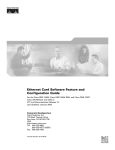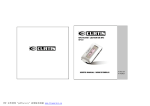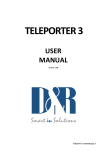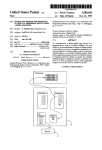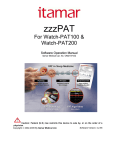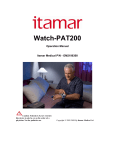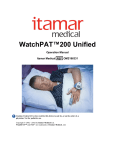Download Cisco OC-12/STM-4 Pluggable Intermediate-Reach (15 km) Transceiver Module
Transcript
Data Sheet Cisco 2-Port Channelized OC-12/STM-4 Shared Port Adapter ® The Cisco I-Flex design combines shared port adapters (SPAs) and SPA interface processors (SIPs) using an extensible design that enables service prioritization for data, voice, and video services. Enterprise and service provider customers can use the improved slot economics resulting from modular port adapters that are interchangeable across Cisco routing platforms. The I-Flex design maximizes connectivity options and offers superior service intelligence through programmable interface processors that deliver line-rate performance. I-Flex enhances speed-to-service revenue and provides a rich set of quality-of-service (QoS) features for premium service delivery while effectively reducing the overall cost of ownership. This data sheet contains the specifications for the Cisco 2-Port Channelized OC12/STM-4 SPA (Figure 1). Figure 1. Cisco 2-Port Channelized OC-12/STM-4 Shared Port Adapter Product Overview The Cisco 2-Port Channelized OC-12/STM-4 SPA is available on high-end Cisco routing platforms offering the benefits of network scalability with lower initial costs and ease of upgrades. The Cisco SPA/SIP portfolio continues the Cisco focus on investment protection along with consistent feature support, broad interface availability, and the latest technology. The Cisco SPA/SIP portfolio allows different interfaces (Packet over SONET/SDH [POS], ATM, Ethernet, etc.) to be deployed on the same interface processor. © 2008 Cisco Systems, Inc. All rights reserved. This document is Cisco Public Information. Page 1 of 6 Data Sheet Applications Internet traffic continues to grow at an explosive rate, with the number of users doubling each year. This unsurpassed growth is increasing the demand for higher-capacity interfaces from OC-3/STM1 to OC-48/STM-16. In addition, POS enables efficient transport of IP traffic and uses SONET/SDH concatenated payloads (that is, STS-3c/VC-4, STS-12c/VC-4-4c, or STS-48c/VC-4-16c) to achieve a higher order of statistical multiplexing. At present, concatenated services at VC-4 rates are available only in some parts of the world (for example, Europe), with higher rates not yet readily available. The new channelized OC-12/STM-4 SPA provides customers in these areas with an STM-4 POS interface that can be provisioned through the traditional network. The Cisco 2-Port Channelized OC-12/STM-4 SPA builds on the SONET/SDH channelization capability. Key Features ● Two channelized OC-12/STM-4 ports per SPA ● SONET mappings ● ◦ STS-12c ◦ STS-3c ◦ STS-1<>DS3 (clear channel) ◦ PDH DS3 (M13 & C-bit) STS-1<>DS3<>DS1 ◦ PDH DS3 (M13 & C-bit) STS-1<>DS3<>DS1<>nxDS0 ◦ STS-1<>VT1.5<>DS1 ◦ STS-1<>VT1.5<>DS1<>nxDS0 SDH mappings (please check platform documentation for support) ◦ STS-1<>DS3<>E1 ◦ STS-1<>VT2<>E1 ◦ STS-1<>VT1.5<>DS1<>nxDS0 ◦ STS-1<>VT2<>E1<>nxDS0 ◦ STS-1<>DS3<>DS1<>nxDS0 ◦ STS-1<>DS3<>E1<>nxDS0 ◦ AU-4-4c ◦ AU-4 ◦ AU-4<>TUG-3<>VC-3<>DS3 ◦ AU-4<>TUG-3<>VC-3<>E3 ◦ AU-3<>VC-3<>DS3 ◦ AU-3<>VC-3<>E3 ◦ AU-4<>TUG-3<>TUG-2<>VC-12<>E1 ◦ AU-3<>TUG-2<>VC-12<>E1 ◦ AU-3<>TUG-2<>VC-11<>DS1 ◦ AU-4<>TUG-3<>TUG-2<>VC-12<>E1<>nxDS0 ◦ AU-3<>TUG-2<>VC-11<>DS1<>nxDS0 ◦ AU-3<>TUG-2<>VC-12<>E1<>nxDS0 © 2008 Cisco Systems, Inc. All rights reserved. This document is Cisco Public Information. Page 2 of 6 Data Sheet ● Channelization support for 4 OC-3 or 12 DS-3 or 336 DS-1 or 2000 DS-0 or n x DS-0 channels, or any combination of these, to a total of 2000 channels ● Multilink bundling on T1/E1 channels as per RFC 1990 ● Subrate DS-3 ● Bit Error Rate Test (BERT) support on T1/E1 channels all 0s, all 1s, 2^11, 2^15, 2^20, 2^20 QRSS, 2^23, alternating 0s and 1s, 1-in-8, 3-in-24, Bit error insertion, Framed all zeroes, Framed all ones ● BERT support on T3/E3 channels T3/E3: 2^23-1 PRBS (inverted), Framed all ones, Framed all zeroes, Bit error insertion, 2^15, 2^20 Product Specifications Table 1 shows the hardware specifications for the channelized OC-12/STM-4 SPA. Table 1. Hardware Specifications for the Cisco 2-Port Channelized OC-12 SPA Features Descriptions Product compatibility Cisco 10000 Series Routers Port density per SPA 2-port channelized OC-12/STM-4 Physical interface (channelized OC-12) OC-12c/STM-4 Small Form-Factor Pluggable (SFP) optics module (refer to optical parameters in Table 2) Visual status indicators (LEDs): ● SPA status LED ● Per-port LEDs ● Carrier and alarm ● Active and loopback Protocols IETF RFC 1490, Frame Relay Encapsulation RFC 1662, Point-to-Point Protocol (PPP) in High-Level Data Link Control (HDLC)-like framing Cisco HDLC Multilink PPP (RFC 1990) (as applicable for 2-port channelized OC-12c/STM-4 (DS-1/E1) FRF.12, link fragmentation and interleaving (LFI) PPP, HDLC, and Frame Relay User Network Interface (UNI) encapsulations Features and functions DS-3 ● Full- and half-duplex connectivity at DS-3 rate (44.736 MHz) ● Scrambling and subrate support of major data-service-unit (DSU) vendors ● C-bit or M23 framing (software selectable) ● MDL ● Support for 16- and 32-bit cyclic redundancy check (CRC) (16-bit default) ● 24-hour history maintained for error statistics and failure counts ● DS-3 alarm and event detection (once-per-second polling) ● Alarm indication signal (AIS) ● Out of frame (OOF) ● Far-end receive failure (FERF) DS-1 ● Superframe (SF) and Extended Superframe (ESF) support ● ANSI T1.403 FDL support ● Internal or line-derived (loop) clocking, independently selectable on each T1 tributary ● Error and alarm detection: CRC errors, framing errors, loss of frame (red), AIS (blue), remote alarm indication (yellow) ● Alarm reporting: 24-hour history maintained, 15-minute intervals on all errors ● BERT at T1 level ● Loopback capabilities: local, network line and network payload, remote network line, and remote network payload at the T1 level © 2008 Cisco Systems, Inc. All rights reserved. This document is Cisco Public Information. Page 3 of 6 Data Sheet Features Descriptions SONET errors, alarms, and performance monitoring Synchronization: ● Local (internal) or loop timed (recovered from network) ● Pointer activity monitoring ● Redundant clock source should be provisioned on different SPAs as only a single timing source can be provided by SPA Local (diagnostic) and line (network) loopback Payload mapping ● POS with 1 + X^43 self-synchronous scrambler SONET/SDH compliance: ● Telcordia (Bellcore) GR-253-CORE (as applicable) ● ANSI T1.105, T1.231 ● ITU-T G.707, G.957, G.825 (as applicable) Supported SONET/SDH alarm and signal events: ● Signal failure bit error rate (SF-ber) ● Signal degrade bit error rate (SD-ber) ● Signal label payload construction (C2) ● Path trace byte (J1) ● Section ● Loss of signal (LoS) ● Loss of frame (LoF) ● Error counts for B1 ● Threshold crossing alarms (TCA) for B1 ● Line ● Line alarm indication signal (LAIS) ● Line remote defect indication (LRDI) ● Line remote error indication (LREI) ● Error counts for B2 ● TCA for B2 ● Path ● Path alarm indication signal (PAIS) ● Path remote defect indication (PRDI) ● Path remote error indication (PREI) ● Error counts for B3 ● TCA for B3 ● Loss of pointer (LoP) ● Positive stuffing event (PSE) ● Negative stuffing event (NSE) ● Path unequipped indication signal (PUNEQ) ● Path payload mismatch indication signal (PPLM) Network management SONET-MIB (RFC 3592) SONET/SDH-MIB (RFC 2558) CISCO-SONET-MIB DS-3/E3-MIB (RFC 3896) DS-1/E1-MIB (RFC 2496) Simple Network Management Protocol (SNMP) Reliability and availability Online insertion and removal (OIR) Field-replaceable SFP optical modules 1+1 SONET Automatic Protection Switching (APS) and SDH Linear Multiplexer Section Protection (MSP) protocols (please check platform support) Single SPA software reset Physical specifications Weight: 1.27 lb (0.57 kg) Height: 1.56 in. (3.96 cm) (double height) Width: 6.75 in. (17.15 cm) Depth: 7.28 in. (18.49 cm) Power 2-port channelized OC-12/STM-4 = 52.0W (with optics) © 2008 Cisco Systems, Inc. All rights reserved. This document is Cisco Public Information. Page 4 of 6 Data Sheet Features Descriptions Environmental specifications Operating temperature: 41 to 104°F (5 to 40°C) Storage temperature: –38 to 150°F (–40 to 70°C) Operating humidity: 5 to 85% relative humidity Storage humidity: 5 to 95% relative humidity Compliance and agency approvals Safety ● UL 60950 ● CSA 22.2-No.60950 ● EN60950 ● IEC 60950 CB Scheme ● ACA TS001 ● AS/NZS 3260 ● EN60825\IEC60825 laser safety (SR, IR-Class 1) (VSR-Class 1M)1 ● 21CFR1040 -FDA Code of Federal Regulations (USA) laser safety (SR, IR-Class 1) (VSR-Class 1M)1 EMC ● FCC Part 15 (CFR 47) ● ICES 003 ● EN55022 ● CISPR 22 ● AS/NZS CISPR22 ● VCCI ● EN55024 ● EN50082-1 ● EN61000-6-1 ● EN61000-3-2 ● EN61000-3-3 Network Equipment Building Standards (NEBS) This product is designed to meet the following requirements (official qualification may be in progress): ● SR-3580 – NEBS: Criteria levels (Level 3 compliant) ● GR-63-CORE – NEBS: Physical protection ● GR-1089-CORE – NEBS: EMC and safety Table 2. Optical Specifications for the Cisco 2-Port Channelized OC-12 SPA SFP Optics Maximum Distance Multimode (MM) Up to 0.25 mi (500m) Single-mode (SM) Up to 1.2 mi (2 km) SM intermediate reach (IR-1) Up to 9 mi (15 km) SM long reach (LR-1) Up to 25 mi (40 km) SM extended reach (LR-2) Up to 50 mi (80 km) Power and Environmental Requirements When installed in Cisco routers, these SPAs do not change the power or environmental requirements and standards of the router platform itself. Refer to the platform-specific data sheets for more information. © 2008 Cisco Systems, Inc. All rights reserved. This document is Cisco Public Information. Page 5 of 6 Data Sheet Ordering Information To place an order, visit the Cisco Ordering Home Page and refer to Table 3. Table 3. Ordering Information Product Name Part Number Cisco 2-Port Channelized OC-12/STM-4 SPA SPA-2XCHOC12/DS0 OC-12/STM-4, OC-12/STM-4 SFP, MM SFP-OC12-MM OC-12/STM-4, OC-12/STM-4 SFP, SM, SR SFP-OC12-SR OC-12/STM-4, OC-12/STM-4 SFP, SM, IR-1 SFP-OC12-IR1 OC-12/STM-4, OC-12/STM-4 SFP, SM, LR-1 SFP-OC12-LR1 OC-12/STM-4, OC-12/STM-4 SFP, SM, LR-2 SFP-OC12-LR2 Service and Support Cisco offers a wide range of services programs to accelerate customer success. These innovative services programs are delivered through a unique combination of people, processes, tools, and partners, resulting in high levels of customer satisfaction. Cisco services help you protect your network investment, optimize network operations, and prepare your network for new applications to extend network intelligence and the power of your business. For more information about Cisco services, refer to Cisco Technical Support Services or Cisco Advanced Services. For More Information For more information about the Cisco SPA/SIP portfolio, visit www.cisco.com/go/spa or contact your local Cisco account representative. Printed in USA © 2008 Cisco Systems, Inc. All rights reserved. This document is Cisco Public Information. C78-495983-00 09/08 Page 6 of 6






